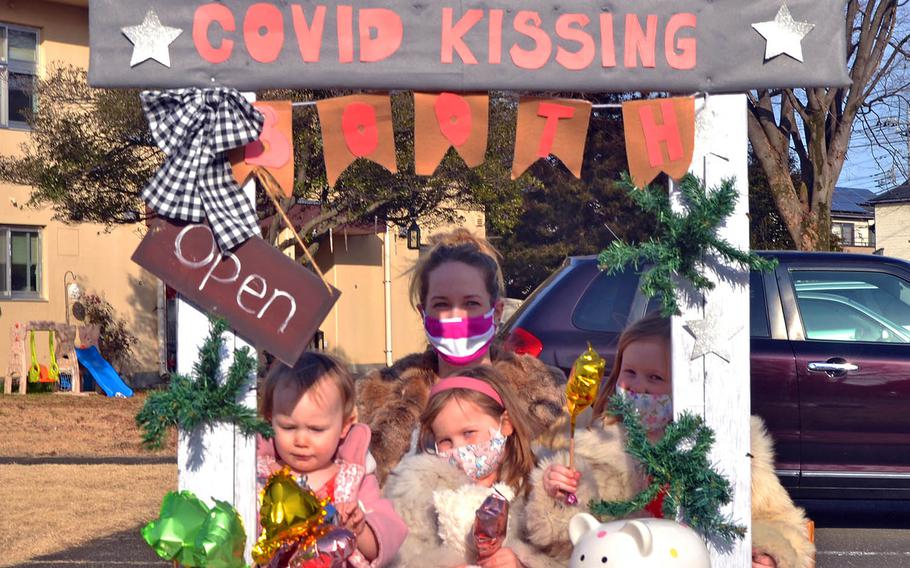
Ashley Stewart and her husband, Maj. Adam Stewart of the 36th Airlift Squadron at Yokota Air Base in Tokyo, used their spare time during the pandemic to round up donations to purchase new toys and furniture for the playroom in a creative way. They built a "COVID Kissing" booth that tenders balloons and Hershey's Kisses at changing locations in the base housing areas and parks. (Erica Earl/Stars and Stripes)
Stars and Stripes is making stories on the coronavirus pandemic available free of charge. See more staff and wire stories here. Sign up for our daily coronavirus newsletter here. Please support our journalism with a subscription.
TOKYO — A year has passed since the world seemingly paused and terms like social distancing became part of the lexicon.
U.S. Forces Japan has reported more than 1,200 individuals infected with the coronavirus in the past year, which was marked by travel restrictions, mask mandates, working from home and sporadic lockdowns. At home, the pandemic has surpassed 500,000 Americans dead from complications of COVID-19, the respiratory disease caused by the virus.
For U.S. military families in Japan, coping with the pandemic meant finding ways to bring joy and productivity back into their lives.
At three installations — Yokota Air Base and Yokosuka and Sasebo naval bases — people discovered ways to stay upbeat and share that feeling with others.
‘COVID Kissing’The pandemic’s onset in March 2020 caused a volunteer-run playroom in a residential tower at Yokota to temporarily close, and without its volunteers to keep it up, a mold and insect infestation set in.
Ashley Stewart and her husband, Maj. Adam Stewart of the 36th Airlift Squadron, used their spare time during the pandemic to round up donations to purchase new toys and furniture for the playroom in a creative way. They built a “COVID Kissing” booth that tenders balloons and Hershey’s Kisses at changing locations in the base housing areas and parks.
The Stewarts built the booth out of scrap materials and throughout the pandemic it has served as a lemonade stand in summer, hot cocoa booth in winter and a cheeky kissing booth around Valentine’s Day.
Ashley runs the booth in her spare time with her 5-year-old twin girls and has raised around $3,000 for the playroom, which reopened in late August and is still being upgraded, she told Stars and Stripes on Feb 12.
“The booth just started as a fun idea I had to play with my kids and take pictures with for the holidays, but I’m glad we can also use it to help people,” she said.
‘Dadosaur’There is a dinosaur on the loose at Yokosuka Naval Base, or at least in one of the residential buildings.
In mid-February, the Jackson family was on its second quarantine since arriving at Yokosuka in December. Seaman Isaiah Jackson, a crew member on the guided-missile destroyer USS Rafael Peralta, decided to have some fun while stuck in their apartment by donning an inflatable dinosaur suit and waving from the balcony to passersby.
The Jacksons had to do the mandatory quarantine as new arrivals in December, and then again when Jackson went back to the United States when his ship did a homeport shift.
“During our first quarantine, one of the toys we had was a dollar-store dinosaur hat,” Emma Jackson, Isaiah’s wife, told Stars and Stripes over Facebook Messenger Feb. 11. “Our 2-year-old loved playing ‘Dadosaur,’ playing tag and hide-and-seek with the hat.”
When Isaiah was back in the U.S., Emma ordered an inflatable dinosaur suit to upgrade the “dadosaur” costume and keep their son entertained during the family’s second quarantine.
“One of the only things we could do to get out of the house is go on our balcony,” she said. “One day my husband decided to walk outside in his costume! He kept ‘rawring’ at people on the street trying to get their attention.”
The Jacksons noticed a positive reaction to the costume as people stopped and laughed and took pictures, and since then, Isaiah continued to make appearances in costume the rest of their quarantine.
The vloggerAnyone with wanderlust found the past year and its patchwork of travel restrictions in Japan a frustrating time.
But Bekah Gilstrap, a program coordinator at the University of Maryland Global Campus on Sasebo Naval Base, wanted to show people that they can still explore and have fun within those limitations.
Gilstrap created a YouTube channel, called BekQuest, to help people figure out local travel plans.
“I loved to travel before COVID,” she recently told Stars and Stripes by Facebook Messenger. “But making these videos helped me explore more locally.”
Gilstrap was busy at the start of the pandemic with a new baby and finishing her bachelor’s degree. Inspired by others taking up new hobbies, she decided to find time to pursue videography, which had held her interest since high school.
“Having a new baby, I wanted to share my experiences with my family in the States so they could see him grow and explore,” she said. “It led to me wanting to inspire the Sasebo community.”
Gilstrap said she was full swing into making and developing her channel by June.
“It motivated me to walk out my front door and look around,” she said. “Now I have all these memories captured to look back on.”
Gilstrap said her favorite places she filmed include Café Nyanko, a cat café; Takeshi Ishihara Forest Park; and an area in Fukushima where visitors can go “glamping,” a portmanteau of “camping” and “glamourous” that usually features extra amenities in a resort-like environment.
Gilstrap said she also hopes the videos help others find ways to safely explore and get out of their homes during the pandemic. She feels great, she said, when someone tells her they discovered a new favorite spot after watching her channel.
earl.erica@stripes.com Twitter: @ThisEarlGirl